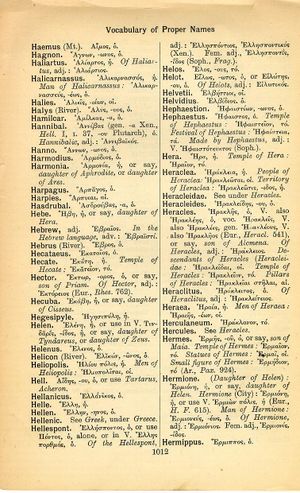Halicarnassus: Difference between revisions
ἔστιν οὖν τραγῳδία μίμησις πράξεως σπουδαίας καὶ τελείας μέγεθος ἐχούσης, ἡδυσμένῳ λόγῳ χωρὶς ἑκάστου τῶν εἰδῶν ἐν τοῖς μορίοις, δρώντων καὶ οὐ δι' ἀπαγγελίας, δι' ἐλέου καὶ φόβου περαίνουσα τὴν τῶν τοιούτων παθημάτων κάθαρσιν → Tragedy is, then, a representation of an action that is heroic and complete and of a certain magnitude—by means of language enriched with all kinds of ornament, each used separately in the different parts of the play: it represents men in action and does not use narrative, and through pity and fear it effects relief to these and similar emotions.
(Names) |
(6_7) |
||
| Line 3: | Line 3: | ||
<b class="b2">Man of Halicarnassus</b>: Ἁλικαρνασσεύς, -έως, ὁ. | <b class="b2">Man of Halicarnassus</b>: Ἁλικαρνασσεύς, -έως, ὁ. | ||
}} | |||
{{Lewis | |||
|lshtext=<b>Hălĭcarnassus</b>: (-sos) or Hali-carnāsus, i, f., = [[Ἁλικαρνασσός]]>,<br /><b>I</b> a [[city]] of [[great]] [[antiquity]] in [[Caria]], the birthplace of the historians [[Herodotus]] and [[Dionysius]], also [[celebrated]] for the mausolēum erected [[there]], [[now]] Bodrun or Boudroum, Mel. 1, 16, 2 and 3; Plin. 5, 29, 29, § 107; Cic. Tusc. 3, 31, 75; id. Q. Fr. 1, 1, 8, § 25; Liv. 37, 10, 11. —<br /><b>II</b> Derivv.<br /> <b>A</b> Hălĭcarnasseus, ĕi and ĕos, m. adj., = Ἁλικαρνασσεύς, of [[Halicarnassus]]: [[Scylax]], Cic. Div. 2, 42, 88: [[Dionysius]], Quint. 3, 1, 16: [[Cleon]], Nep. Lys. 5.—<br /> <b>B</b> Hălĭcarnassĭi, ōrum, m., the inhabitants of [[Halicarnassus]], Halicarnassians, Tac. A. 4, 55.—<br /> <b>C</b> Hălĭcarnas-senses, ĭum, m., the [[same]], Liv. 33, 20, 12. | |||
}} | }} | ||
Revision as of 08:32, 13 August 2017
English > Greek (Woodhouse)
Ἁλικαρνασσός, ἡ.
Man of Halicarnassus: Ἁλικαρνασσεύς, -έως, ὁ.
Latin > English (Lewis & Short)
Hălĭcarnassus: (-sos) or Hali-carnāsus, i, f., = Ἁλικαρνασσός>,
I a city of great antiquity in Caria, the birthplace of the historians Herodotus and Dionysius, also celebrated for the mausolēum erected there, now Bodrun or Boudroum, Mel. 1, 16, 2 and 3; Plin. 5, 29, 29, § 107; Cic. Tusc. 3, 31, 75; id. Q. Fr. 1, 1, 8, § 25; Liv. 37, 10, 11. —
II Derivv.
A Hălĭcarnasseus, ĕi and ĕos, m. adj., = Ἁλικαρνασσεύς, of Halicarnassus: Scylax, Cic. Div. 2, 42, 88: Dionysius, Quint. 3, 1, 16: Cleon, Nep. Lys. 5.—
B Hălĭcarnassĭi, ōrum, m., the inhabitants of Halicarnassus, Halicarnassians, Tac. A. 4, 55.—
C Hălĭcarnas-senses, ĭum, m., the same, Liv. 33, 20, 12.

